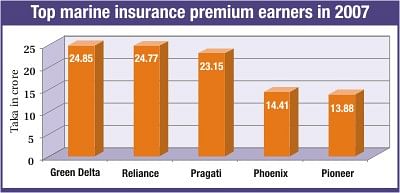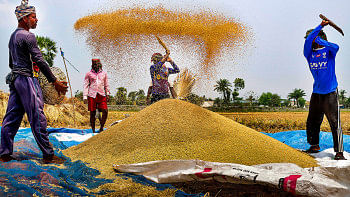Recession weighs on marine insurance premiums

Turmoil in global financial markets and hefty commodity price falls are poised to substantially reduce marine insurance premiums this year.
Coupled with the uncertainty lingering over the implementation of the new law, industry insiders said the situation would hurt the industry.
“We feel the pinch of the crisis since the beginning of the year, regarding the marine insurance premiums,” said Nasir A Choudhury, managing director of Green Delta Insurance.
Rafiqul Islam, managing director of Pragati Insurance, said: “It is evident that the premium from marine insurance will go down this year because of a steep decline in commodity prices on the international market.”
Marine insurance covers the loss or damage of ships, cargo, terminals, and any transport or property by which cargo is transferred, acquired, or held between the points of origin and final destination. Marine premiums are directly dependent on the velocity of corporate growth. The collections are linked both to volumes of exports and imports and the pricing.
Premiums from marine insurance account for nearly 25 percent of a company's total premium income. The amount is far more for some companies, according to industry data. Only fire insurance premiums are higher than marine insurance.
The insurance sector has been growing at a double-digit rate for the past several years, despite political uncertainty, natural calamities such as floods and cyclones and the economic slowdown.
Bangladesh's insurance industry is composed of 18 life insurers (including state-owned Jiban Bima Corporation) and 44 general insurance companies (including state-owned Sadharan Bima Corporation).
Premiums from both life and non-life insurance stood at a combined Tk 3,854 crore in 2007, a rise from Tk 3,257 crore a year ago. Life premium increased 18.67 percent to Tk 2,916 crore and non-life by about 18 percent to Tk 938 crore. The rate of growth was 33.59 percent and 12.41 percent respectively in 2006.
Of the non-life insurance premiums, marine alone accounts for about Tk 375 crore, according to the Insurance Year Book of 2007.
“The ongoing global financial crisis that slashed demand and prices, starts biting into marine insurance premium,” said a senior official of Reliance Insurance. But he declined to quantify the extent of the impact, at the moment.
Prices of steel, rice, wheat, edible and fuel oil have all significantly come down since the middle of last year. Steel, which was sold at $800 a tonne last year, now sells at $200.
However, industry people are in woes over the implementation of the new law that was approved by the immediate past caretaker government, than the reduction in premiums. The industry was upbeat on the replacement of the 70-year-old insurance laws (1938 Act), with two ordinances aiming to modernise the sector.
The cabinet approved two ordinances in July. The Insurance Regulatory Authority (IRA) Ordinance 2008 and Insurance Ordinance (IO) 2008 were gazetted in October 2008, with the president's assent.
With the enforcement of the IRA Ordinance 2008, the Department of Insurance will no longer exist and the sector will rid the Insurance Act, 1938, once the IO 2008 comes into effect.
“Laws must be present to run the industry. Currently, there is neither the old law nor the newly approved law,” said Rafiqul Islam, also the president of Bangladesh Insurance Association.
Nasir A Choudhury said the new law has been formulated to improve the poor capital base of the industry.
He claimed the private sector insurance companies contributed immense sums of money and efforts to formulate the new law.
The new ordinances have been drafted in line with the international best practices, particularly following India's Insurance Regulatory and Development Authority model.
[email protected]

 For all latest news, follow The Daily Star's Google News channel.
For all latest news, follow The Daily Star's Google News channel. 



Comments